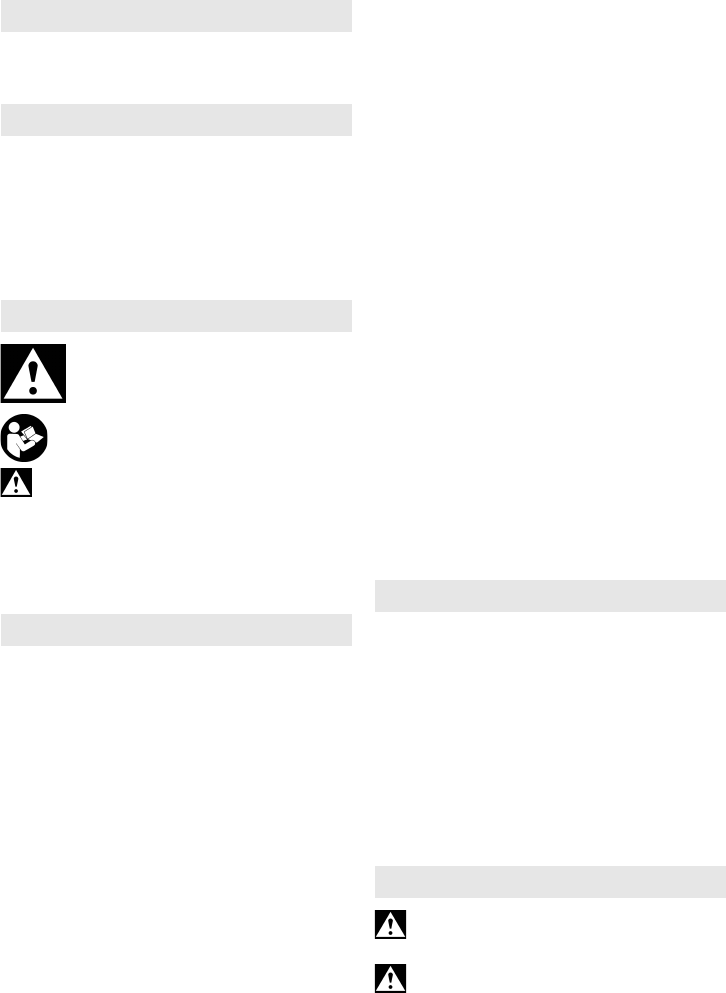
ENGLISH en
9
Original instructions
We, being solely responsible, hereby declare that
this product conforms to the standards and
directives specified on page 3.
The drill is suitable for non-impact drilling into metal,
wood, plastic and similar materials. It is also
suitable for thread tapping and screwdriving.
The user bears sole responsibility for any damage
caused by improper use.
Generally accepted accident prevention
regulations and the enclosed safety information
must be observed.
For your own protection and for the
protection of your electrical tool, pay
attention to all parts of the text that are
marked with this symbol!
WARNING – Reading the operating instruc-
tions will reduce the risk of injury.
WARNING Read all safety warnings and
instructions. Failure to follow all safety warn-
ings and instructions may result in electric shock,
fire and/or serious injury.
Keep all safety instructions and information for
future reference.
Pass on your electrical tool only together with these
documents.
Use the additional handle supplied with the
tool. Loss of control can cause personal injury.
Hold the power tool by insulated gripping
surfaces, when performing an operation where
the cutting accessory may contact hidden
wiring or its own cord. Cutting accessory
contacting a “live” wire may make exposed metal
parts of the power tool “live” and could give the
operator an electric shock.
Pull the plug out of the plug socket before any
adjustments or servicing are performed.
Avoid inadvertent starts by always unlocking the
switch when the plug is removed from the mains
socket or in case of a power cut.
Ensure that the spot where you wish to work is
free of power cables, gas lines or water pipes
(e.g. using a metal detector).
Smaller workpieces must be secured such that they
are not carried along with the drill bit when drilling
(e.g. by clamping in a vice or on a work bench with
screw clamps).
Keep hands away from the rotating tool! Remove
chips and similar material only when the machine is
not in operation.
Metabo S-automatic safety clutch. When the safety
clutch responds, switch off the machine
immediately! If the tool jams or catches, the power
supply to the motor is restricted. Due to the strong
force which can arise, always hold the machine with
both hands using the handles provided, stand
securely and concentrate.
The Metabo S-automatic safety clutch must not be
used for torque control.
Caution must be exercised when driving screws into
hard materials (driving screws with metric or
imperial threads into steel)! The screw head may
break, or a high reverse torque may build up on the
handle.
Dust from material such as paint containing lead,
some wood species, minerals and metal may be
harmful. Contact with or inhalation of the dust may
cause allergic reactions and/or respiratory diseases
to the operator or bystanders.
Certain kinds of dust are classified as carcinogenic
such as oak and beech dust especially in
conjunction with additives for wood conditioning
(chromate, wood preservative). Material containing
asbestos must only be treated by specialists.
- Where the use of a dust extraction device is
possible it shall be used.
- The work place must be well ventilated.
- The use of a dust mask of filter class P2 is
recommended.
Follow national requirements for the materials you
want to work with.
See page 2.
1 Thumbwheel for gear selection
2 Additional handle / Additional handle with
vibration damping *
3Geared chuck*
4 Futuro Plus keyless chuck *
5 Speed preselection setting wheel*
6 Electronic signal indicator*
7 Rotation selector switch
8 Locking button for continuous activation
9Trigger switch
* depending on equipment
Before plugging in, check that the rated mains
voltage and mains frequency, as stated on the
rating label, match with your power supply.
To ensure that the drill chuck is securely fitted:
After initial drilling (clockwise), use a
screwdriver to firmly tighten the safety screw inside
the drill chuck (if applicable / model-specific).
1. Declaration of Conformity
2. Specified Use
3. General Safety Instructions
4. Special Safety Instructions
5. Overview
6. Initial Operation


















